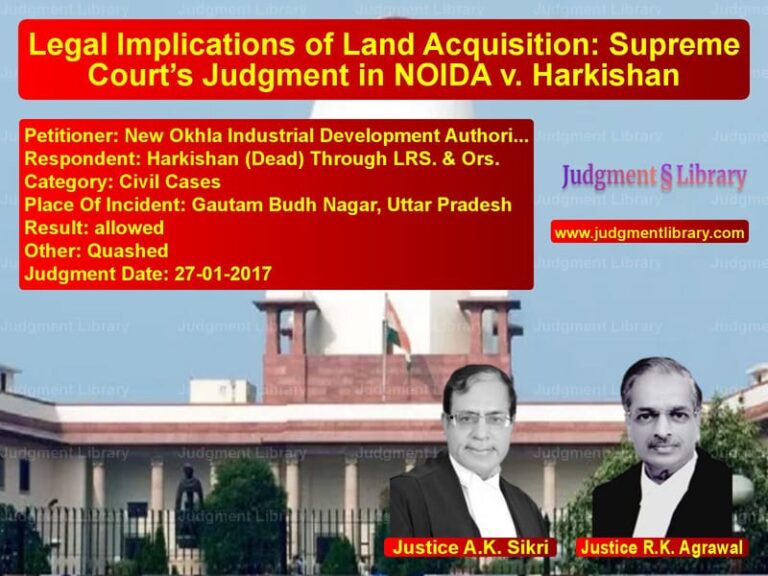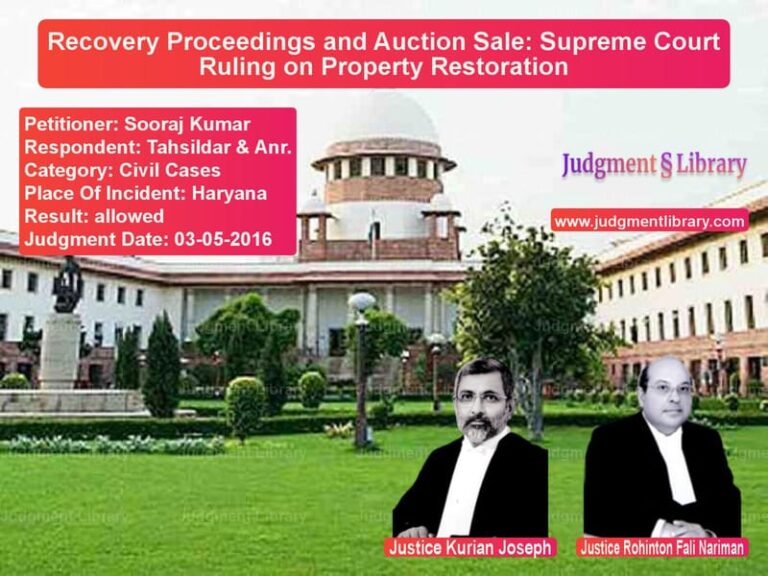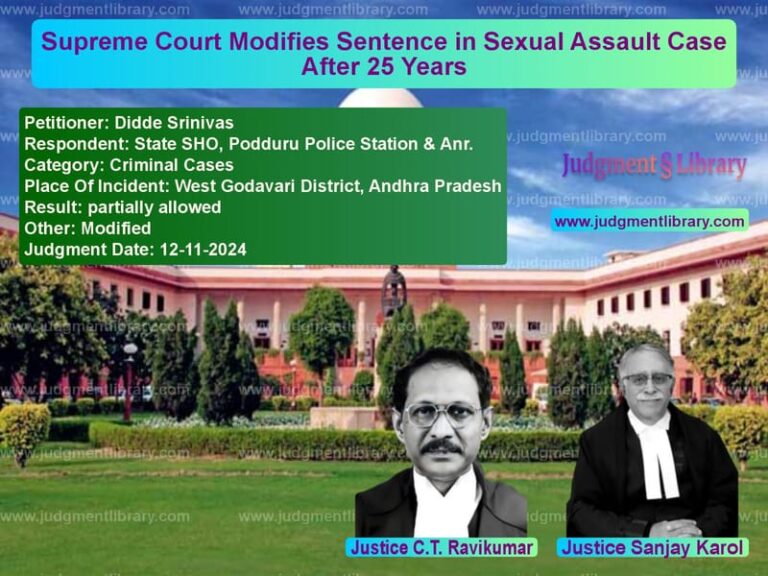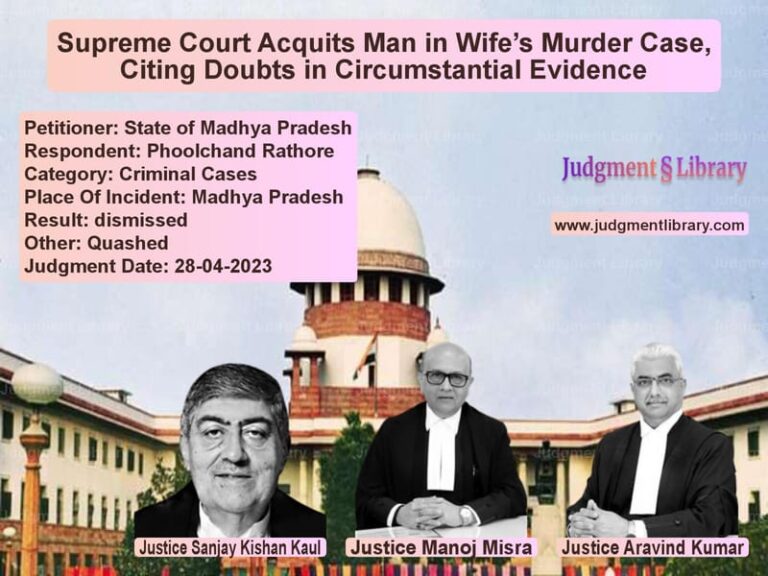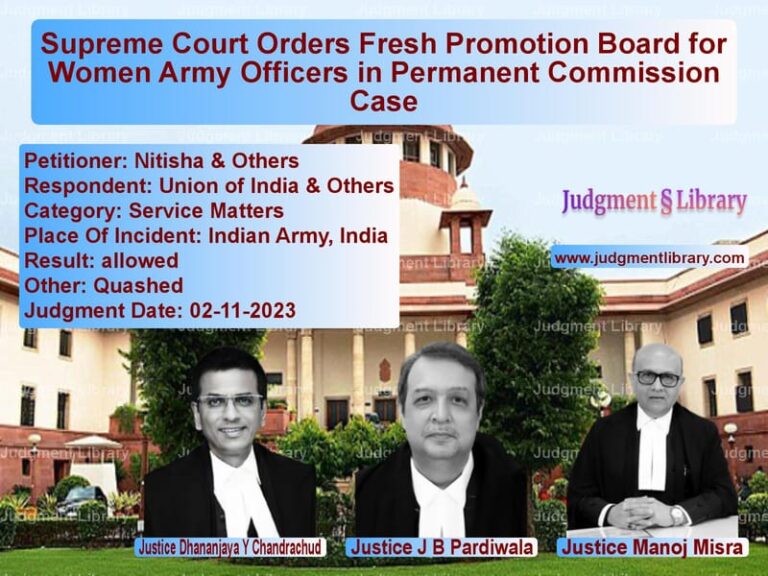Supreme Court Upholds Policyholder’s Rights in Overseas Mediclaim Dispute Against Insurer
In a landmark judgment, the Supreme Court of India ruled in favor of policyholder Manmohan Nanda in his dispute against United India Assurance Co. Ltd. The case involved the wrongful repudiation of an Overseas Mediclaim Policy on the grounds of alleged non-disclosure of a pre-existing medical condition. The Court held that the insurer had unfairly rejected the claim and emphasized that insurance contracts are governed by the principle of uberrimae fidei (utmost good faith). The judgment is a significant victory for policyholders who face arbitrary denials from insurance companies.
Background of the Case
The dispute arose when Manmohan Nanda, an Indian businessman, purchased an Overseas Mediclaim Policy from United India Assurance Co. Ltd. prior to his travel to the United States. As part of the policy issuance process, he underwent a mandatory medical examination, which recorded that he was suffering from diabetes mellitus Type II. However, no cardiac conditions were detected during this examination.
After arriving in San Francisco, USA, Nanda suffered a cardiac episode and had to undergo an emergency angioplasty and stent placement. Upon filing a claim for medical expenses, the insurer rejected the claim, citing that:
- The policyholder had a pre-existing medical condition of diabetes and hyperlipidaemia (high cholesterol), which were risk factors for cardiac ailments.
- The insurer argued that the policy contract contained a clause excluding claims arising from pre-existing diseases.
- The non-disclosure of hyperlipidaemia and its potential impact on heart health was allegedly a breach of the policyholder’s duty of disclosure.
Nanda contested the insurer’s decision, arguing that he had disclosed all medical conditions to the insurance company and that there was no prior knowledge of any heart disease. His plea was initially rejected by the insurance ombudsman and the National Consumer Disputes Redressal Commission (NCDRC), prompting him to approach the Supreme Court.
Arguments by the Petitioner
Nanda’s counsel contended that the insurer’s repudiation of the claim was unlawful and based on arbitrary grounds:
- The insurer had full knowledge of the petitioner’s diabetes at the time of issuing the policy, as it was disclosed in his pre-policy medical examination.
- The insurer had access to all his medical reports and had still chosen to issue the policy without any exclusions related to cardiac ailments.
- There was no medical evidence to suggest that Nanda had any pre-existing cardiac disease before his travel.
- Diabetes and high cholesterol are common conditions that do not necessarily lead to heart disease, and insurers cannot make retrospective assumptions.
- The insurer’s rejection of the claim violated the principle of uberrimae fidei, which mandates complete transparency and fairness in insurance contracts.
Arguments by the Respondents
The insurer, United India Assurance Co. Ltd., defended its decision to reject the claim:
- The policy contained a pre-existing disease exclusion clause, which exempted the insurer from liability for claims arising from pre-existing conditions.
- The petitioner had been diagnosed with diabetes and hyperlipidaemia, both of which are established risk factors for heart disease.
- The insurer asserted that, had Nanda disclosed his cholesterol condition, the underwriters might have reconsidered issuing the policy.
- The insurer relied on its interpretation of the medical link between diabetes, cholesterol, and heart disease to justify claim repudiation.
Supreme Court’s Observations and Ruling
After examining the evidence, the Supreme Court ruled in favor of Nanda, stating that:
- The insurer had full knowledge of Nanda’s diabetes at the time of issuing the policy and had still accepted the risk.
- There was no evidence that Nanda had been diagnosed with any heart condition before traveling to the USA.
- The insurer’s attempt to retrospectively connect diabetes and cholesterol to heart disease was speculative and unsupported by medical evidence.
- The rejection of the claim violated the principle of uberrimae fidei, as the insurer failed to clarify policy exclusions at the time of issuance.
The Court held:
“Each of the medical reports submitted before us confirms that the policyholder had disclosed diabetes mellitus Type II. There is no evidence that he had any pre-existing cardiac ailment. The insurer cannot reject claims based on assumptions rather than concrete evidence.”
The Court ordered the insurer to:
- Reimburse Nanda’s medical expenses incurred for his cardiac treatment in the USA.
- Pay interest at 6% per annum on the claim amount from the date of filing.
- Bear litigation costs amounting to ₹1,00,000.
Key Legal Precedents Considered
The Supreme Court referenced several past judgments to support its ruling:
- Satwant Kaur Sandhu v. New India Assurance Co. – Established that insurers must prove deliberate misrepresentation before rejecting claims.
- LIC v. Smt. G.M. Channabasamma – Held that insurers must explicitly inform policyholders of any exclusions at the time of issuing policies.
- Canara Bank v. United India Insurance – Reinforced that ambiguity in insurance contracts should be interpreted in favor of policyholders.
Implications of the Judgment
This ruling has far-reaching consequences for policyholders and the insurance industry:
- Protection for Policyholders: Insurers cannot arbitrarily deny claims by linking disclosed conditions to unrelated ailments.
- Stricter Regulation on Claim Rejections: The ruling discourages the practice of insurers misusing exclusion clauses.
- Transparency in Insurance Contracts: Insurers must clearly define pre-existing conditions and their implications before issuing policies.
- Strengthened Consumer Rights: Policyholders now have stronger legal backing when contesting unfair claim rejections.
Final Verdict
The Supreme Court’s judgment in Manmohan Nanda v. United India Assurance Co. Ltd. reinforces the principle that insurance companies must act in good faith and honor valid claims. The ruling prevents insurers from arbitrarily linking disclosed medical conditions to later ailments and ensures that policyholders receive the benefits they are entitled to.
This case sets an important precedent for similar disputes in health and travel insurance, protecting policyholders from unjustified claim rejections and ensuring that insurance companies uphold their contractual obligations fairly.
Petitioner Name: Manmohan Nanda.Respondent Name: United India Assurance Co. Ltd. & Anr.Judgment By: Justice Dhananjaya Y Chandrachud, Justice B.V. Nagarathna.Place Of Incident: San Francisco, USA.Judgment Date: 06-12-2021.
Don’t miss out on the full details! Download the complete judgment in PDF format below and gain valuable insights instantly!
Download Judgment: manmohan-nanda-vs-united-india-assuran-supreme-court-of-india-judgment-dated-06-12-2021.pdf
Directly Download Judgment: Directly download this Judgment
See all petitions in Health Insurance Disputes
See all petitions in Life Insurance Claims
See all petitions in Insurance Settlements
See all petitions in Judgment by Dhananjaya Y Chandrachud
See all petitions in Judgment by B.V. Nagarathna
See all petitions in allowed
See all petitions in supreme court of India judgments December 2021
See all petitions in 2021 judgments
See all posts in Insurance Cases Category
See all allowed petitions in Insurance Cases Category
See all Dismissed petitions in Insurance Cases Category
See all partially allowed petitions in Insurance Cases Category


